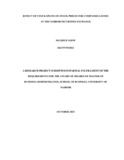| dc.description.abstract | A stock split occurs when a company’s board of directors authorizes issuing additional
shares to existing shareholders. Each shareholder receives new shares in proportion to the
shares already owned. The overall value of the outstanding shares does not change, but
the value of individual shares goes down in proportion to the number of new shares
issued. There are theories that explain why companies undertake stock splits such as
signaling hypothesis, optimal tick size hypothesis and optimal price range hypothesis.
Some arguments have been that stock splits are no more than a cosmetic accounting
change with no direct costs or benefits. However despite these stock splits still remain a
common occurrence implying that that there must be some benefit either real or
perceived, that result from a firm splitting its stock. This study sought to determine the
effects of stock splits on stock prices for companies listed at the NSE. This study
employed an event study methodology where the effect of stock split on share price was
investigated for a period of 60 days in pre and post stock split date. The study covered the
period between 2004 and 2014 with a sample size of eleven companies out of fifteen that
had split their shares in that period. Secondary data collected from NSE on the daily stock
prices of the eleven companies for 30 day pre-split period and 30 day post-split period.
Coefficient of variation to measure the price volatility for the two periods-pre-split period
and post-split period was calculated to determine the stock price behavior during the presplit
and post-split periods. The stocks were found to be unstable in the pre-split periods
but were stable in the post-split period. Stock prices were also found to be high in the presplit
period and low in the post-split period. This study concludes that split brought prices
down and stabilized stock prices in the NSE. | en_US |

